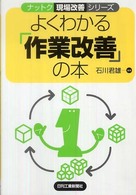- ホーム
- > 洋書
- > 英文書
- > Politics / International Relations
基本説明
Joachim's deft examination of the documents, proceedings, and actions of the UN and woman's advocacy reveals flaws in state-centered international relations theories as applied to UN policy.
Full Description
In the mid-1990s, when the United Nations adopted positions affirming a woman's right to be free from bodily harm and to control her own reproductive health, it was both a coup for the international women's rights movement and an instructive moment for nongovernmental organizations (NGOs) seeking to influence UN decision making.
Prior to the UN General Assembly's 1993 Declaration on the Elimination of All Forms of Violence against Women and the 1994 decision by the UN's Conference on Population and Development to vault women's reproductive rights and health to the forefront of its global population growth management program, there was little consensus among governments as to what constituted violence against women and how much control a woman should have over reproduction. Jutta Joachim tells the story of how, in the years leading up to these decisions, women's organizations got savvy—framing the issues strategically, seizing political opportunities in the international environment, and taking advantage of mobilizing structures—and overcame the cultural opposition of many UN-member states to broadly define the two issues and ultimately cement women's rights as an international cause.
Joachim's deft examination of the documents, proceedings, and actions of the UN and women's advocacy NGOs—supplemented by interviews with key players from concerned parties, and her own participant-observation—reveals flaws in state-centered international relations theories as applied to UN policy, details the tactics and methods that NGOs can employ in order to push rights issues onto the UN agenda, and offers insights into the factors that affect NGO influence. In so doing, Agenda Setting, the UN, and NGOs departs from conventional international relations theory by drawing on social movement literature to illustrate how rights groups can motivate change at the international level.
Contents
Preface
Introduction: From the Margins to the Center—Women's Rights, NGOs, and the United Nations
1. NGOs and UN Agenda-Setting: Political Opportunities, Mobilizing Structures, and Framing Strategies
2. Rallying for Peace and Equal Nationality Rights: Women's Organizations between 1915 and 1945
3. Equality, Development and Peace: The UN Decade for Women, 1975-1985
4. Women's Rights as Human Rights: The Case of Violence against Women
5. Reproductive Rights and Health: Women's Organizations and the Population Establishment
6. NGOs and International Organizations
Appendix: UN Declaration on the Elimination of All Forms of Violence against Women
Notes
References
Index







